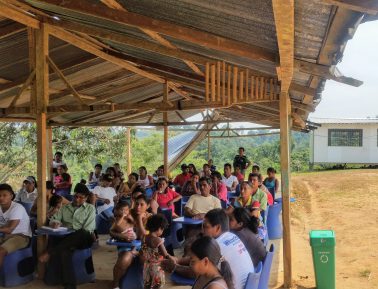
Description of the project: The project is carried out in the indigenous Ecuadorian community of Eperara de Santa Rosa. Women’s groups organised themselves to reclaim their ancestral medicine culture, while strengthening their climate resilience. Based on a collective decision in favor of the community’s health, they decided to take their own actions in response to the COVID-19 pandemic. They carried out a mapping process to identify medicinal plants for use as a resource to protect their health and that of their families. The community thereby realised that the food production and habitat management depend on many factors such as ancestral culture, gender-responsive economy, biodiversity conservation, education and housing.
Financially supported by: CEDU, Aprendizaje en Movimiento, MINKA SUR






